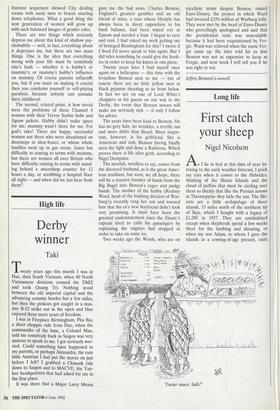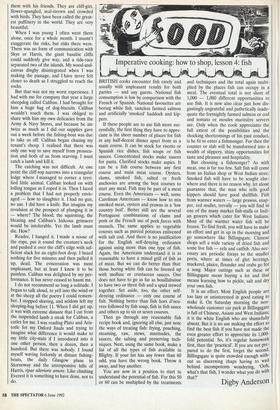Long life
First catch your sheep
Nigel Nicolson
As I lie in bed at this time of year lis- tening to the early weather forecast, I prick my ears when it comes to the Hebrides, thinking of the Shiant Islands and the cloud of puffins that must be circling over them so thickly that like the Persian arrows at Thermopylae they hide the sun. The Shi- ants are a little archipelago of three islands, 13 miles north of the northern tip of Skye, which I bought with a legacy of £1,200 in 1937. They are uninhabited except when shepherds spend a few weeks there for the lambing and shearing, or when my son Adam, to whom I gave the islands as a coming-of-age present, visits
`Tartar sauce, lads?' them with his friends. They are cliff-girt, flower-spangled, seal-strewn and crowded with birds. They have been called the great- est puffinery in the world. They are very beautiful.
When I was young I often went there alone, once for a whole month. I mustn't exaggerate the risks, but risks there were. There was no form of communication with Skye or Harris, the giant basaltic cliffs could suddenly give way, and a tide-race
separated two of the islands. My wood-and- canvas dinghy disintegrated when I was making the passage, and I have never felt closer to death as I struggled to reach the rocks.
But that was not my worst experience. I had with me for company that year a large sheepdog called Caliban. I had brought for him a huge bag of dog-biscuits. Caliban wouldn't touch them. I was obliged to share with him my own delicacies from the Army & Navy Stores, and because he ate twice as much as I did our supplies gave out a week before the fishing-boat was due to take us off. Caliban began chasing my tenant's sheep. I realised that there was only one way to save myself from prosecu- tion and both of us from starving. I must catch a lamb and kill it.
The catching was not difficult. At one point the cliff-top narrows into a triangular ledge where I managed to corner a terri- fied little animal. Caliban looked on with lolling tongue as I roped it in. Then I faced a problem that I had not properly envis- aged — how to slaughter it. I had no gun, no axe. I did have a knife. But imagine my
revulsion at the prospect of plunging it in — where? The blood, the squirming, the bleating and Caliban's hideous grimaces would be intolerable. Yet the lamb must die. How?
Reader, I hanged it. I made a noose of the rope, put it round the creature's neck and pushed it over the cliffs edge with suf- ficient slack for an eight-foot drop. I heard nothing for five minutes and then pulled it up, dead. The evisceration was most unpleasant, but at least I knew it to be painless. Caliban was delighted by my per- formance. It has never ceased to haunt me.
I do not recommend so long a solitude. I began to talk aloud, to yell into the wind or at the sheep all the poetry I could remem- ber. I stopped shaving, and seldom left my sleeping-bag before 11. When I did get up, it was with extreme distaste that I cut from the suspended lamb a steak for Caliban, a cutlet for me. I was reading Plato and Aris- totle for my Oxford finals and trying to imagine what difference it would make to my little city-state if I introduced into it one other person, then a dozen, then a hundred. But there was nobody. I found myself waving forlornly at distant fishing-
boats, the daily Glasgow plane to Stornoway and the unresponsive hills of Harris, ripae ulterioris amore. Like climbing Everest it is something to have done, not to do.



































































 Previous page
Previous page